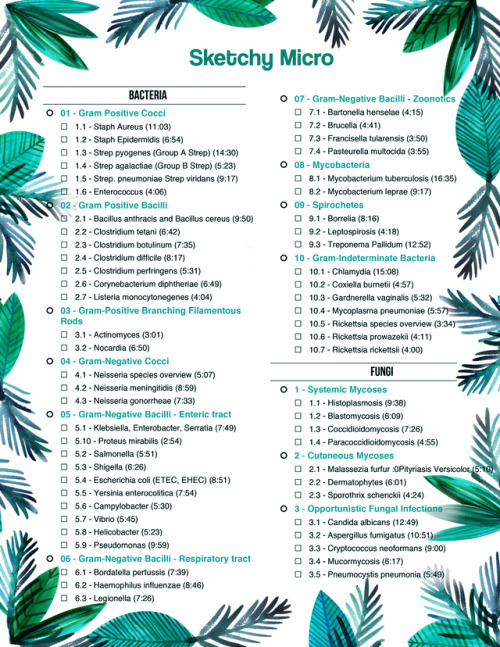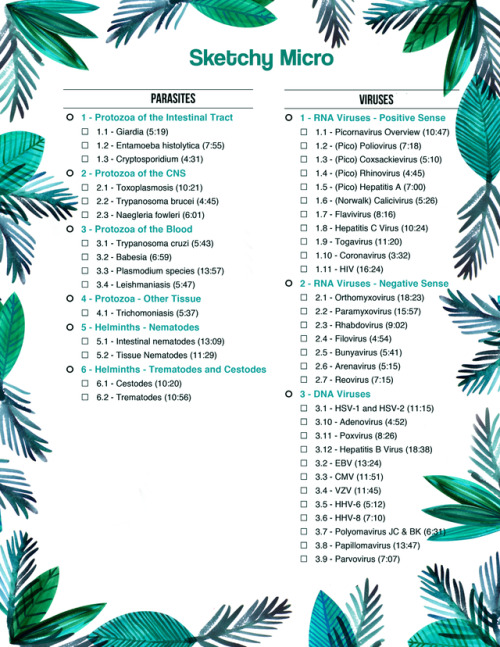Sketchy Micro To Do List:


Sketchy Micro To Do List:
• 01 - Gram Positive Cocci o 1.1 - Staph Aureus (11:03) o 1.2 - Staph Epidermidis (6:54) o 1.3 - Strep pyogenes (Group A Strep) (14:30) o 1.4 - Strep agalactiae (Group B Strep) (5:23) o 1.5 - Strep. pneumoniae Strep viridans (9:17) o 1.6 - Enterococcus (4:06) • 02 - Gram Positive Bacilli o 2.1 - Bacillus anthracis and Bacillus cereus (9:50) o 2.2 - Clostridium tetani (6:42) o 2.3 - Clostridium botulinum (7:35) o 2.4 - Clostridium difficile (8:17) o 2.5 - Clostridium perfringens (5:31) o 2.6 - Corynebacterium diphtheriae (6:49) o 2.7 - Listeria monocytonegenes (4:04) • 03 - Gram-Positive Branching Filamentous Rods o 3.1 - Actinomyces (3:01) o 3.2 - Nocardia (6:50) • 04 - Gram-Negative Cocci o 4.1 - Neisseria species overview (5:07) o 4.2 - Neisseria meningitidis (8:59) o 4.3 - Neisseria gonorrheae (7:33) • 05 - Gram-Negative Bacilli - Enteric tract o 5.1 - Klebsiella, Enterobacter, Serratia (7:49) o 5.10 - Proteus mirabilis (2:54) o 5.2 - Salmonella (5:51) o 5.3 - Shigella (6:26) o 5.4 - Escherichia coli (ETEC, EHEC) (8:51) o 5.5 - Yersinia enterocolitica (7:54) o 5.6 - Campylobacter (5:30) o 5.7 - Vibrio (5:45) o 5.8 - Helicobacter (5:23) o 5.9 - Pseudomonas (9:59) • 06 - Gram-Negative Bacilli - Respiratory tract o 6.1 - Bordatella pertussis (7:39) o 6.2 - Haemophilus influenzae (8:46) o 6.3 - Legionella (7:26)
• 07 - Gram-Negative Bacilli - Zoonotics o 7.1 - Bartonella henselae (4:15) o 7.2 - Brucella (4:41) o 7.3 - Francisella tularensis (3:50) o 7.4 - Pasteurella multocida (3:55) • 08 - Mycobacteria o 8.1 - Mycobacterium tuberculosis (16:35) o 8.2 - Mycobacterium leprae (9:17) • 09 - Spirochetes o 9.1 - Borrelia (8:16) o 9.2 - Leptospirosis (4:18) o 9.3 - Treponema Pallidum (12:52) • 10 - Gram-Indeterminate Bacteria o 10.1 - Chlamydia (15:08) o 10.2 - Coxiella burnetii (4:57) o 10.3 - Gardnerella vaginalis (5:32) o 10.4 - Mycoplasma pneumoniae (5:57) o 10.5 - Rickettsia species overview (3:34) o 10.6 - Rickettsia prowazekii (4:11) o 10.7 - Rickettsia rickettsii (4:00) • Fungi • 1 - Systemic Mycoses o 1.1 - Histoplasmosis (9:38) o 1.2 - Blastomycosis (6:09) o 1.3 - Coccidioidomycosis (7:26) o 1.4 - Paracoccidioidomycosis (4:55) • 2 - Cutaneous Mycoses o 2.1 - Malassezia furfur :0Pityriasis Versicolor (5:10) o 2.2 - Dermatophytes (6:01) o 2.3 - Sporothrix schenckii (4:24) • 3 - Opportunistic Fungal Infections o 3.1 - Candida albicans (12:49) o 3.2 - Aspergillus fumigatus (10:51) o 3.3 - Cryptococcus neoformans (9:00) o 3.4 - Mucormycosis (6:17) o 3.5 - Pneumocystis pneumonia (5:49)
• Parasites • 1 - Protozoa of the Intestinal Tract o 1.1 - Giardia (5:19) o 1.2 - Entamoeba histolytica (7:55) o 1.3 - Cryptosporidium (4:31) • 2 - Protozoa of the CNS o 2.1 - Toxoplasmosis (10:21) o 2.2 - Trypanosoma brucei (4:45) o 2.3 - Naegleria fowleri (6:01) • 3 - Protozoa of the Blood o 3.1 - Trypanosoma cruzi (5:43) o 3.2 - Babesia (6:59) o 3.3 - Plasmodium species (13:57) o 3.4 - Leishmaniasis (5:47) • 4 - Protozoa - Other Tissue o 4.1 - Trichomoniasis (5:37) • 5 - Helminths - Nematodes o 5.1 - Intestinal nematodes (13:09) o 5.2 - Tissue Nematodes (11:29) • 6 - Helminths - Trematodes and Cestodes o 6.1 - Cestodes (10:20) o 6.2 - Trematodes (10:56)
• Viruses • 1 - RNA Viruses - Positive Sense o 1.1 - Picornavirus Overview (10:47) o 1.2 - (Pico) Poliovirus (7:18) o 1.3 - (Pico) Coxsackievirus (5:10) o 1.4 - (Pico) Rhinovirus (4:45) o 1.5 - (Pico) Hepatitis A (7:00) o 1.6 - (Norwalk) Calicivirus (5:26) o 1.7 - Flavivirus (8:16) o 1.8 - Hepatitis C Virus (10:24) o 1.9 - Togavirus (11:20) o 1.10 - Coronavirus (3:32) o 1.11 - HIV (16:24) • 2 - RNA Viruses - Negative Sense o 2.1 - Orthomyxovirus (18:23) o 2.2 - Paramyxovirus (15:57) o 2.3 - Rhabdovirus (9:02) o 2.4 - Filovirus (4:54) o 2.5 - Bunyavirus (5:41) o 2.6 - Arenavirus (5:15) o 2.7 - Reovirus (7:15) • 3 - DNA Viruses o 3.1 - HSV-1 and HSV-2 (11:15) o 3.10 - Adenovirus (4:52) o 3.11 - Poxvirus (8:26) o 3.12 - Hepatitis B Virus (18:38) o 3.2 - EBV (13:24) o 3.3 - CMV (11:51) o 3.4 - VZV (11:45) o 3.5 - HHV-6 (5:12) o 3.6 - HHV-8 (7:10) o 3.7 - Polyomavirus JC & BK (6:31) o 3.8 - Papillomavirus (13:47) o 3.9 - Parvovirus (7:07)
More Posts from T-b-a-blr-blog and Others

Gram staining

desmosome a circular, dense body that forms the site of attachment between certain epithelial cells, especially those of stratified epithelium of the epidermis, which consist of local differentiations of the apposing cell membranes.
-Exfoliatin
A staphylococcus toxin - Cleaves the desmosomes in the stratum granulosum - Separates layers of skin. - Example: Scalded skin syndrome (occurs more often in infants)

DNA viruses Mnemonic
NOT MINE!!!! This brilliant mnemonic was created by the youtuber 100lyric. Here are the videos explaining this super useful visual aid:
“Easy ways to remember DNA viruses”
“Easy ways to remember DNA viruses part 2”
I just recreated the drawing she made and added a couple of things, to remember detaiIs better.
All DNA viruses are ds except Parvovirus = the viruses that have 2 lines, are double stranded.
All DNA viruses are linear except Polyomavirus, Papilomavirus, Hepadnavirus= Not drawn with straight lines (Polyoma, Papiloma: circular; Hepadna: semicircular)
All DNA viruses are icosahedral except Poxvirus= that’s why is in a different color (green). This virus is a complex, diamond shape virus.
All DNA viruses replicate in the nucleus except Poxvirus = that’s why I drew something inside the diamond shape virus, to represent the DNA-dependant RNA polymerase.
Like I said, this is NOT MY MNEMONIC! But it helped me a lot, and now it’s so easy for me to remember this viruses! Please, go subscribe to her channel, is amazing!!!! 100lyric
And If you need a mnemonic to remember RNA viruses, click here and here.
Hope this helps!
Without immunity, we’RE JUST BAGS OF NUTRIENTS!
Microbiology lecturer (via scienceprofessorquotes)
Bacterial strain X is resistant to Ampicillin and sensitive to Gentamycin. Bacterial strain Y is resistane to gentamycin and sensitive to Ampicillin. Bacterial strain X and Y are grown in mixed culture in medium without antibiotics, then the culture is plated on medium containing both ampicillin…

Prokaryotic cell

Positives are violet in color and negatives are red or pink on gram stain! My untidy handwritten notes here.
Antibiotics: Protein Synthesis Inhibitors
Protein Synthesis
Formation of Initiation Complex (tRNA in P site)
aa incoorporation (tRNA in A site, aminoacyl-tRNA)
Formation of Peptide Bond (peptidyltransferase)
Translocation

MNEMONIC: “ALi eSTá Cuasi MAL”
* Inhibit 1: “ALi”
A minoglycosides
Li nezolid
* Inhibit 2: “eSTá”
S treptogramins
T etracyclins
* Inhibit 3: “Cuasi”
C loramphenicol
* Inhibit 4: "MAL"
M acrolides
A minoglycosides
L incosamides
This one’s about bugs
Guys, I love ID. I really hope I get to do an ID rotation on Medicine. If you remember, I once posted the mnemonic I swear by for viruses. Well here is the bacteria counterpart. Also your micro mantra should be: sketchy is life. Love Andrew like I do (this part’s not the mantra, I just love Andrew).

Let me know if you have any questions or need clarification. This is a perfect example of a “not aesthetically pleasing tumblr study post” because sometimes your handwriting sucks and you aint got that kinda time in my life for pretty arrows and banners and I just wanna finish this shit so I can leave the library when will Step 1 even be over why is this my liiiiiife
Dose Dependent effects of Dopamine mnemonic

Simplified version of Dopamine’s dose-dependent MAJOR effects:
low doses - activates D1 receptors (Gs) - vasodilates renal blood vessels*
med.doses - activates B1 receptors (Gs) - increases heart rate/contractility etc..
high doses - activates A1 (Gq) - vasoconstricts,
*increased renal perfusion, GFR, also vasodilates mesenteric and coronary vessels
source: http://reference.medscape.com/drug/intropin-dopamine-342435
-
 sassynightyouth liked this · 1 week ago
sassynightyouth liked this · 1 week ago -
 massiveduckcycle liked this · 9 months ago
massiveduckcycle liked this · 9 months ago -
 duckyfann9871 liked this · 1 year ago
duckyfann9871 liked this · 1 year ago -
 mads-angelxoxo liked this · 1 year ago
mads-angelxoxo liked this · 1 year ago -
 deafeningcroissantgothopera-blog liked this · 1 year ago
deafeningcroissantgothopera-blog liked this · 1 year ago -
 miazzzma liked this · 1 year ago
miazzzma liked this · 1 year ago -
 studyhard2studyabroad reblogged this · 1 year ago
studyhard2studyabroad reblogged this · 1 year ago -
 miazzzma reblogged this · 1 year ago
miazzzma reblogged this · 1 year ago -
 lmarksblog liked this · 2 years ago
lmarksblog liked this · 2 years ago -
 medcrypto liked this · 2 years ago
medcrypto liked this · 2 years ago -
 king-of-mashed-potatoes liked this · 3 years ago
king-of-mashed-potatoes liked this · 3 years ago -
 seowens88 liked this · 3 years ago
seowens88 liked this · 3 years ago -
 docfergy liked this · 3 years ago
docfergy liked this · 3 years ago -
 mysickbeat liked this · 3 years ago
mysickbeat liked this · 3 years ago -
 the-normal-value reblogged this · 3 years ago
the-normal-value reblogged this · 3 years ago -
 kgevaria-blog liked this · 3 years ago
kgevaria-blog liked this · 3 years ago -
 notmebyeee liked this · 3 years ago
notmebyeee liked this · 3 years ago -
 marigoldhufflepuff liked this · 3 years ago
marigoldhufflepuff liked this · 3 years ago -
 medimagination reblogged this · 4 years ago
medimagination reblogged this · 4 years ago -
 florasstudies reblogged this · 4 years ago
florasstudies reblogged this · 4 years ago -
 cg902100-blog liked this · 4 years ago
cg902100-blog liked this · 4 years ago -
 mysticalwitchlover-blog1 reblogged this · 4 years ago
mysticalwitchlover-blog1 reblogged this · 4 years ago -
 miazzzma reblogged this · 4 years ago
miazzzma reblogged this · 4 years ago -
 jasonberbera liked this · 4 years ago
jasonberbera liked this · 4 years ago -
 alymbbs liked this · 4 years ago
alymbbs liked this · 4 years ago -
 leeeovitate liked this · 4 years ago
leeeovitate liked this · 4 years ago -
 omgitsfama liked this · 4 years ago
omgitsfama liked this · 4 years ago -
 futuredoctorpharmd-blog reblogged this · 4 years ago
futuredoctorpharmd-blog reblogged this · 4 years ago -
 futuredoctorpharmd-blog reblogged this · 5 years ago
futuredoctorpharmd-blog reblogged this · 5 years ago -
 futuredoctorpharmd-blog liked this · 5 years ago
futuredoctorpharmd-blog liked this · 5 years ago -
 germoniaco liked this · 5 years ago
germoniaco liked this · 5 years ago -
 drahnafshahriar-blog liked this · 5 years ago
drahnafshahriar-blog liked this · 5 years ago -
 thundergrace liked this · 5 years ago
thundergrace liked this · 5 years ago -
 coochienervoussystem liked this · 5 years ago
coochienervoussystem liked this · 5 years ago -
 coochienervoussystem reblogged this · 5 years ago
coochienervoussystem reblogged this · 5 years ago -
 sweet-devil-sweet liked this · 5 years ago
sweet-devil-sweet liked this · 5 years ago -
 eventhebestdayhasastorm liked this · 5 years ago
eventhebestdayhasastorm liked this · 5 years ago -
 siamesefever liked this · 5 years ago
siamesefever liked this · 5 years ago -
 etherealife15 liked this · 5 years ago
etherealife15 liked this · 5 years ago -
 free-medical-content liked this · 5 years ago
free-medical-content liked this · 5 years ago -
 lotoyo-blog liked this · 5 years ago
lotoyo-blog liked this · 5 years ago -
 miazzzma reblogged this · 5 years ago
miazzzma reblogged this · 5 years ago -
 martian-chaos reblogged this · 5 years ago
martian-chaos reblogged this · 5 years ago